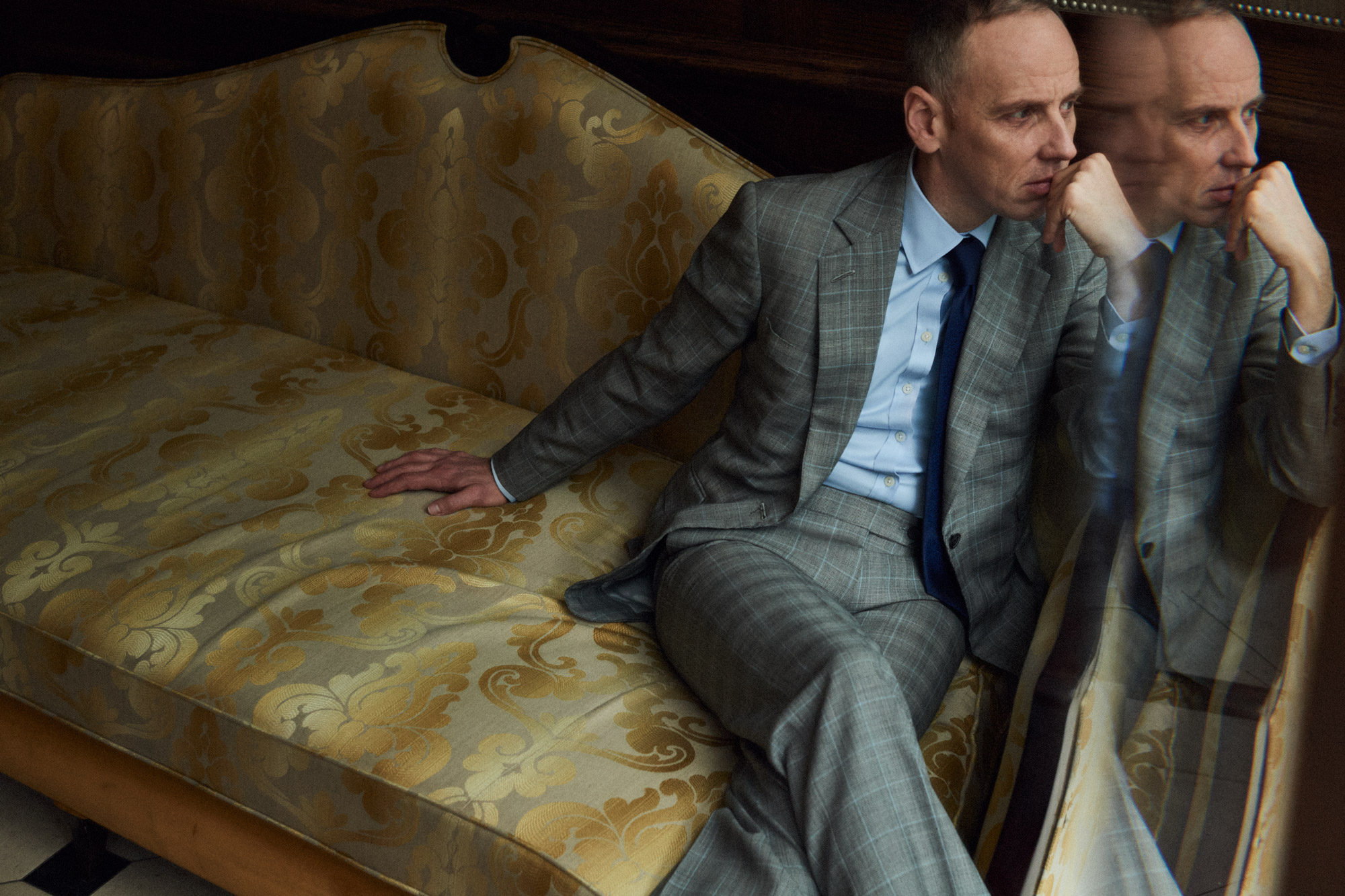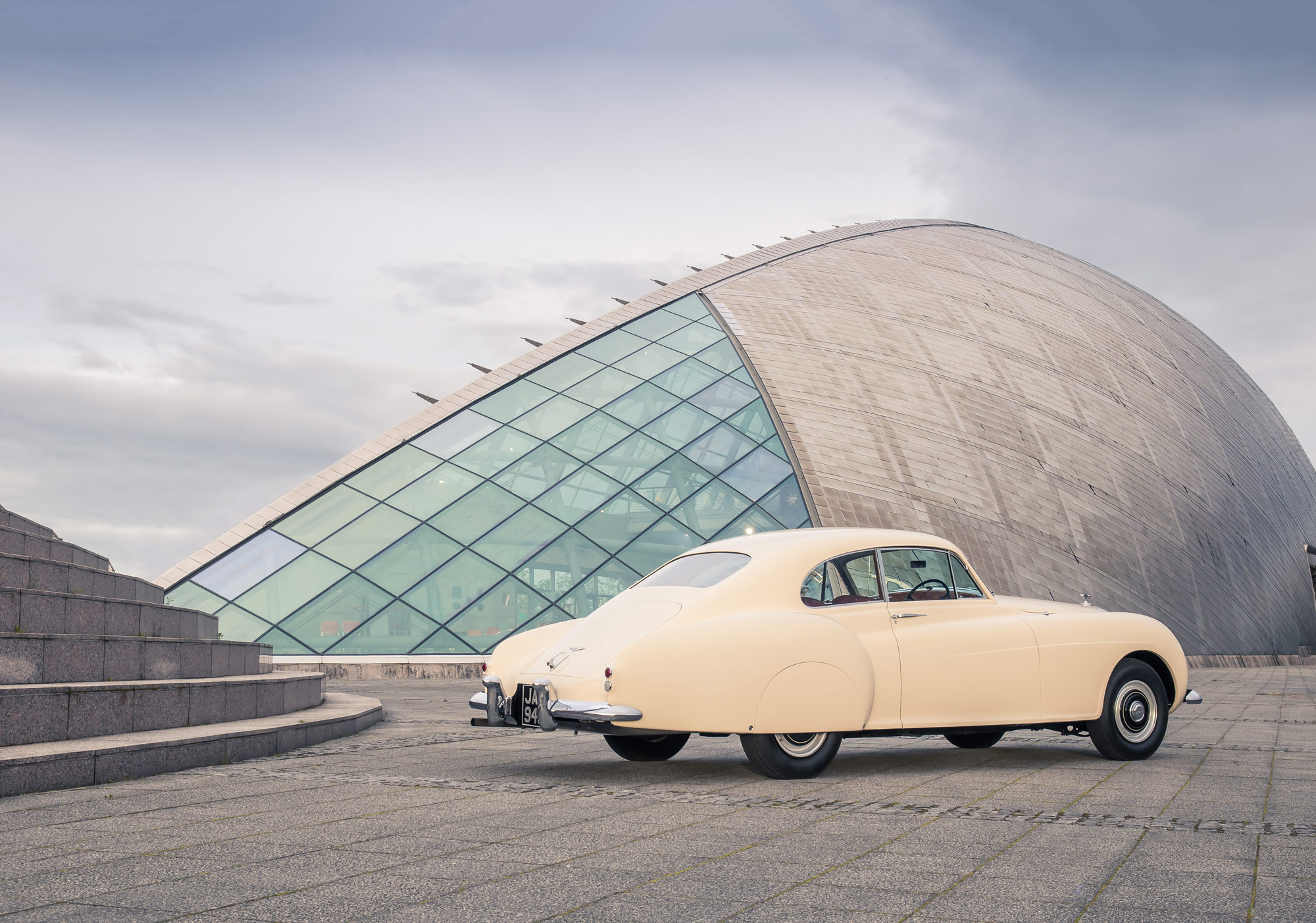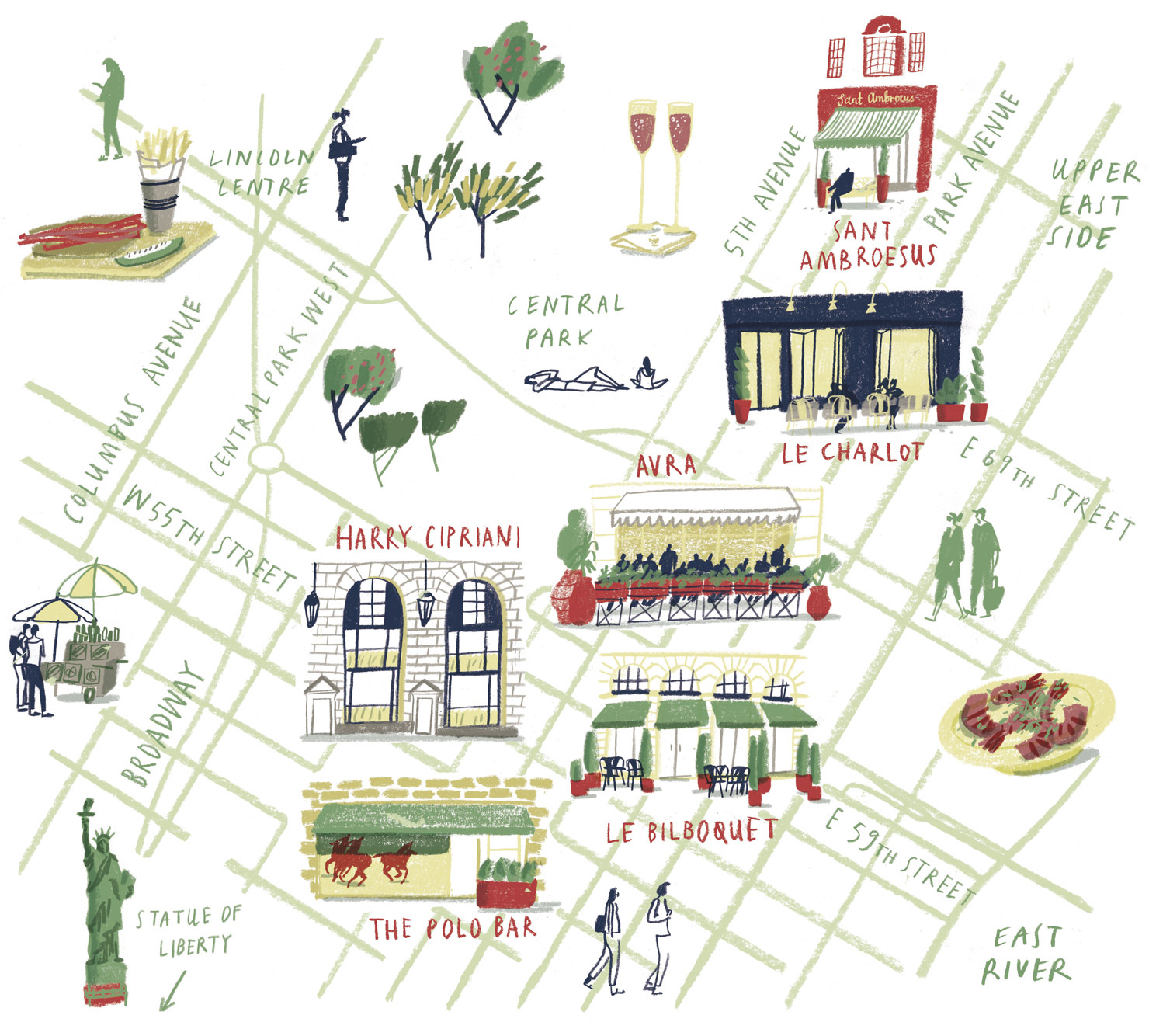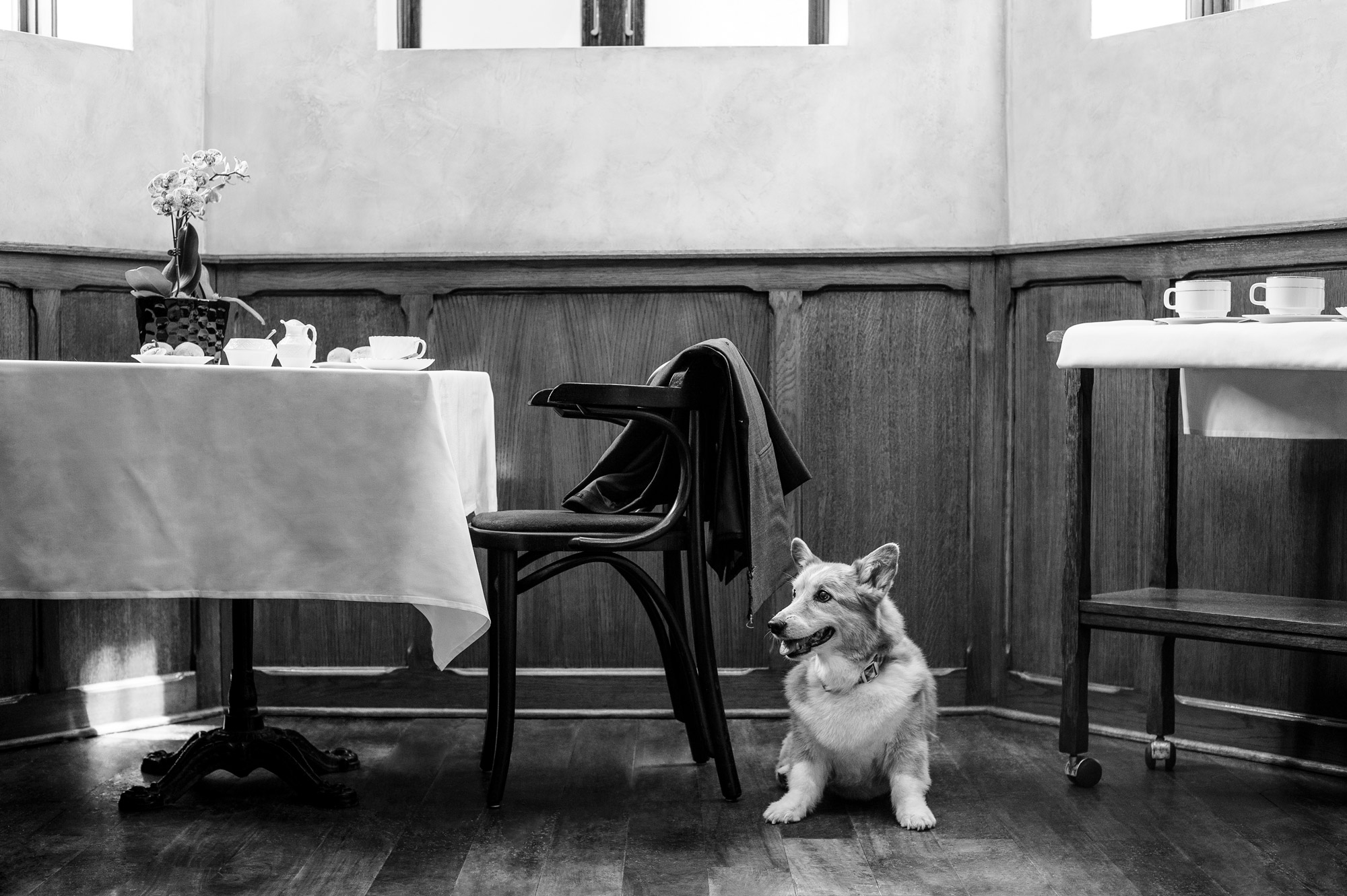The Goring isn’t one of London’s best-known hotels, but it’s a damn good one. Just a five-minute walk from the modern developments and pandemonium surrounding London’s Victoria station, the location for The Cork photoshoot is an Edwardian world away, a baroque oasis of tranquility and gentility. Family-run, quietly excellent, it’s the only hotel to hold a Royal Warrant from the Queen for its hospitality – rated the best in the UK by the readers of the US edition of Condé Nast Traveller magazine.
The Goring is looking good for its age, its decor having recently been refreshed as part of a 105-year birthday makeover. The wallpaper in the lobby depicts an English parkland spotted with wild animals that represent members of the Goring family. The gloriously maximalist Royal Suite, meanwhile, is “papered” with green silk originally woven for the first-class dining room of the Titanic. Hanging in the capacious shower is a full-length oil painting of Queen Victoria, protected by specially commissioned airline glass; a smaller picture of Edmund Blackadder and Queenie adorns the more modest “throne room”. Boasting more character than you could shake a sceptre at, it’s brilliantly eccentric.
With no fewer than 95 acting credits to his name on IMDB, Ewen Bremner’s CV could be described in the same way. Over his eclectic career, the 45-year-old has played such disparate roles as drug addicts, army rangers and Salvador Dalí, spanning the entire cinematic spectrum from obscure indie to unavoidable blockbuster. He’s been directed by Danny Boyle in Trainspotting, Ridley Scott in Black Hawk Down and Mike Leigh in Naked. He’s acted for Woody Allen in not one but two films, Match Point and You Will Meet a Tall Dark Stranger, and opposite auteur Werner Herzog in Harmony Korine’s Julien Donkey-Boy. If you wanted to pigeonhole someone so multi- faceted, you might characterise Bremner as a “character actor” – that’s to say, a genuinely talented one who isn’t sufficiently famous or glamorous to be a leading man in the conventional Hollywood sense. Hence he’s cast in movies like Pearl Harbor, in his own words, “to make Ben Affleck look good”.
Much more handsome, and less manic, than his wild-eyed creations, the equanimous Bremner looks pretty good himself off screen. The benefit of a good night’s sleep in one of the Goring’s slightly less opulent suites, perhaps – or his quietly excellent English Cut bespoke suit, a single-breasted three-piece in navy JJ Minnis flannel. “There’s nothing that I like more than watching people who are really good at – and care about – what they do,” he explains over a cup of camomile tea in the plush bar and lounge, which is like Christian Grey’s Red Room but more comfortable. “It makes me feel uplifted. And I could see that with Tom and Karl [Matthews, English Cut’s in-house stylist]. There’s a reason that they’re still doing what they’re doing.”
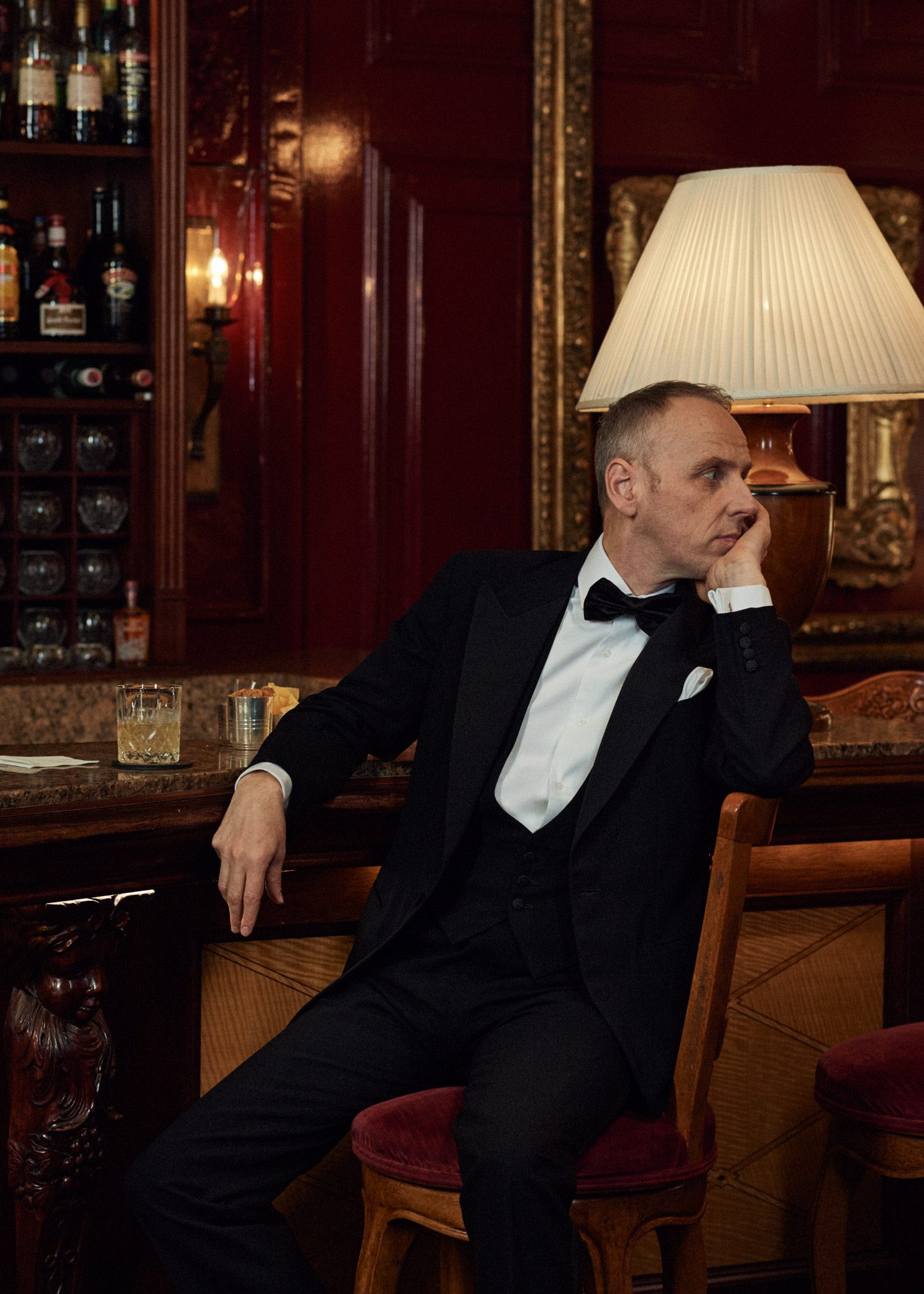
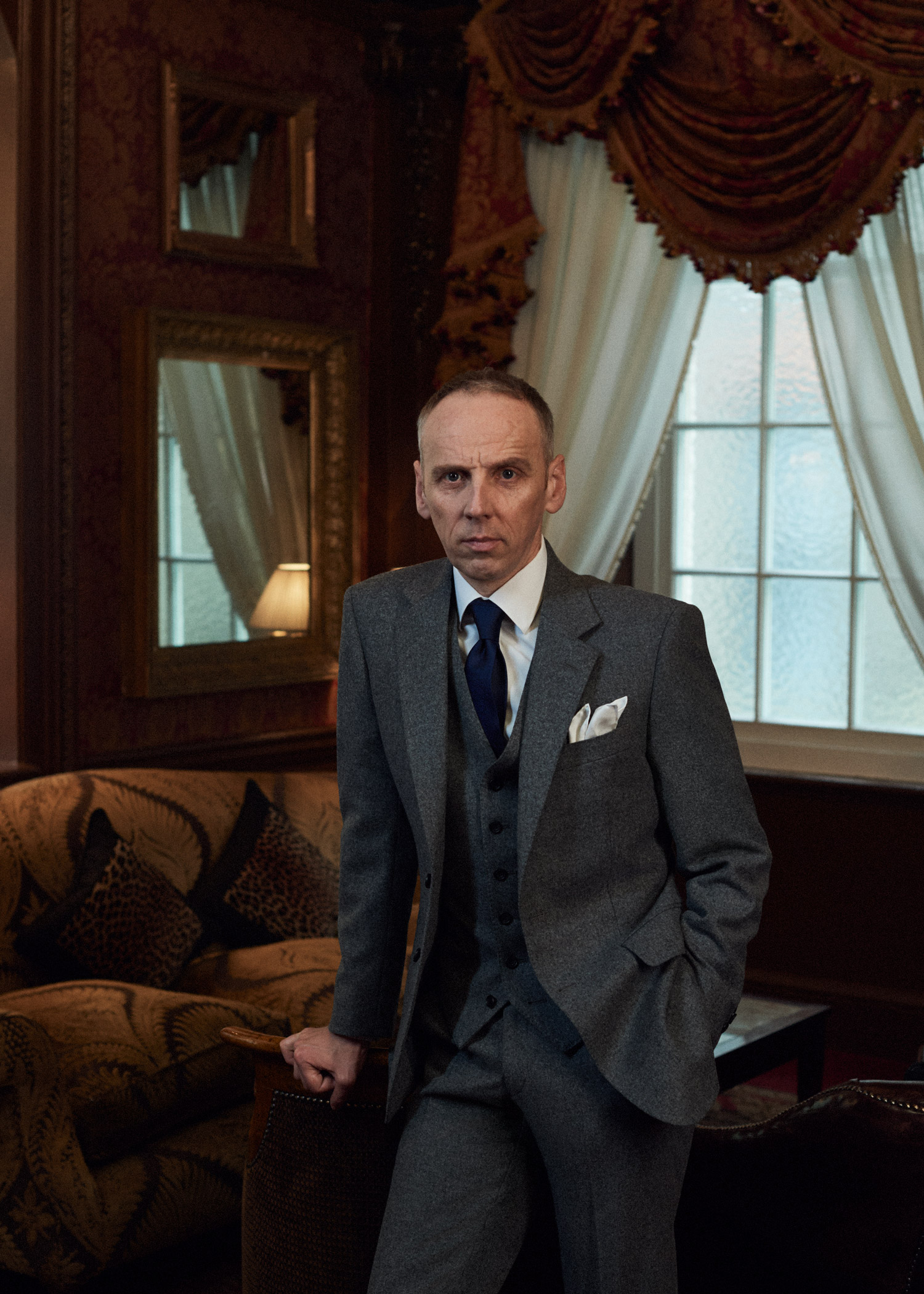
Given his multiple dramatic personae, Bremner is no stranger to costume fittings. But he was entirely unfamiliar with having them for himself until six months ago, when he and the rest of the cast of T2 Trainspotting were invited to have a suit made by his native Edinburgh’s Stewart Christie (founded in 1700 and royal warrant holder to King George V, an accolade it still qualifies for as a maker of military uniforms). “It had never occurred to me that you would have something made for you,” says Bremner. “I’ve been tailored a lot for work, but not for my own personal life.” Although this was only his second time, he’s quickly getting used to it: “Certainly you feel very tidy in a suit that’s built especially for you.”
When not wearing bespoke suits, Bremner describes his habitual habiliment with typical self-deprecation as “grandad style”. “I wear a lot of flat caps,” he says. “I’ve also got this overcoat and occasionally I catch sight of myself and think, ‘Oh my God, I look like a 60-year-old from the 60s.’” A fairer and more accurate description might be “Peaky Blinder”: not razor-sharp, but with a perceptible edge. “I like well-made clothes that have a good aesthetic, but I don’t like to feel super done-up,” he says. “I like something that I feel I could sleep in – not that I would. I don’t like to be too precious about clothes.”
There’s nothing that I like more than watching people who are really good at – and care about – what they do. It makes me feel uplifted”
It’s only relatively recently that Bremner has honed his discerning individual taste. “For most of my life I didn’t really understand much about fashion,” he says. “I didn’t know how to find something that I felt comfortable in, or that was actually my size. So I was quite haphazard.” Ironically, the knowledge of what does and doesn’t suit him was acquired through outfitting his alter-egos, which is sort of like shopping on behalf of other people. “Every time I start a production, I work with a costume designer on establishing a particular look,” he says. “So I think that through much repeated experience, I have become more attuned to how something fits and the message that it’s conveying. And I realised that clothes have the potential to say a hell of a lot about somebody.”
Clothes don’t quite make the man, in Bremner’s estimation. “I think that character comes from inside somebody, and is brought out by circumstance,” he says. “It might not be clear what somebody’s character is until they’re in a situation that demands that they stand up for themselves, or fight for something. But character is expressed through the way that people present themselves.” What clothes can do is make it clear how a character values themselves: their self-worth or lack thereof. “So I wouldn’t start off by thinking, ‘How does this person look?’” he says. “I’d think, ‘How does this person feel? And if they feel like that, how might they choose to present themselves in the world?’”
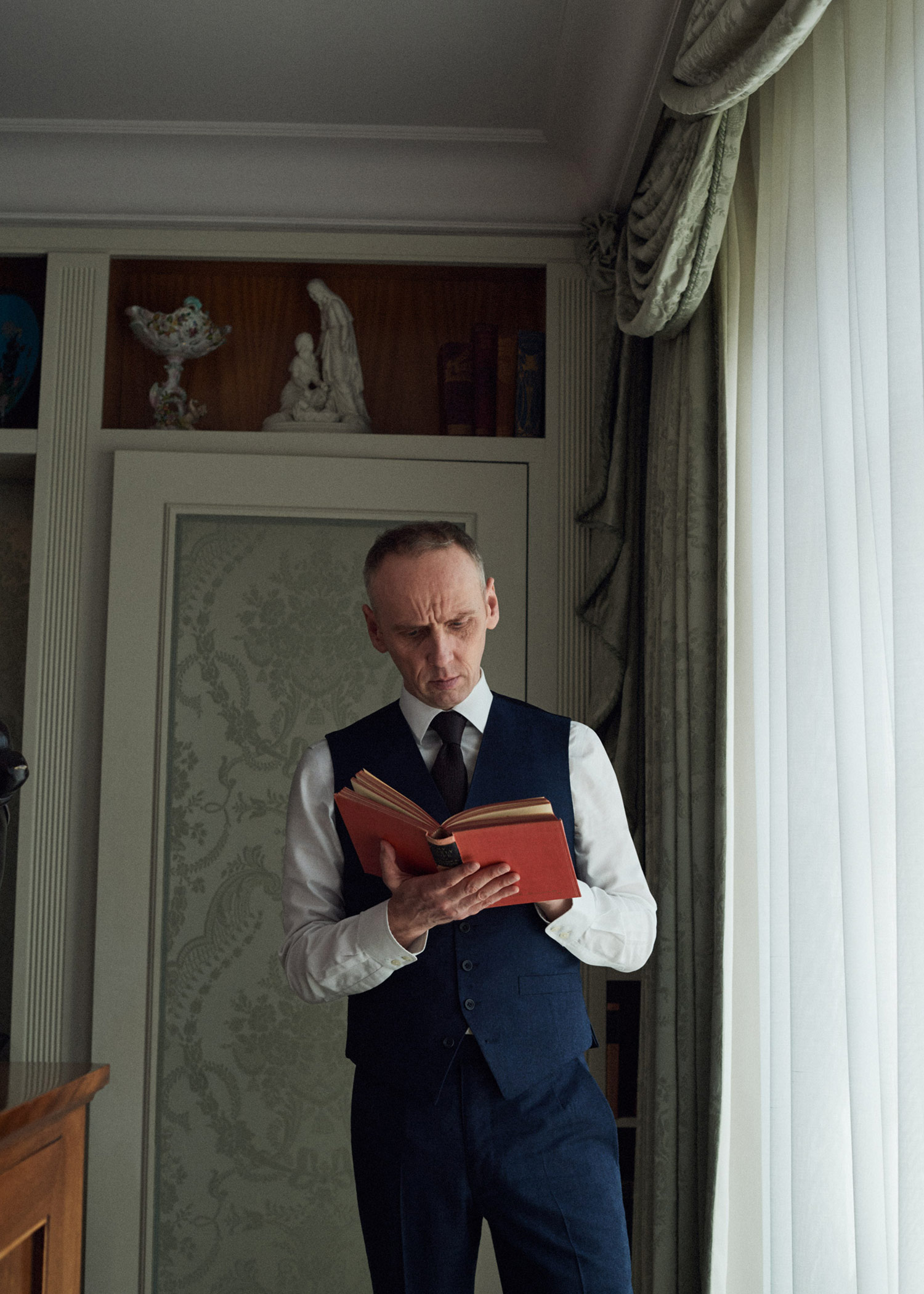
Clothes can also make an actor adjust their performance. A good example is Trainspotting, the kinetic film adaptation of Irvine Welsh’s track marks-and-all novel about destitute Edinburgh junkies. Released in 1996, it gave the careers of Bremner and his castmates – Ewan McGregor, Robert Carlyle and Jonny Lee Miller – plus director Danny Boyle a shot in the arm that they all got stratospherically high on. And it’s probably still the thing that Bremner is most known for, not least because the long-awaited sequel – T2 Trainspotting – finally arrived in cinemas at the start of this year, two decades on from the iconic original. If not exactly a household name, he is currently an even more recognisable face than usual thanks to “the reawakening of the Trainspotting giant”.
Bremner nearly missed that cultural behemoth because of a disagreement about clothes. Trainspotting was set primarily in Leith, the docklands district of Edinburgh that regards itself as a separate city, where Bremner himself grew up. Like similar areas in other cities, Leith is predominantly working-class and crippled by poverty. “I felt that it was important to find something that was faithful to that area and time,” he says. “But the costume designer, Rachael Fleming, and Danny were throwing around a lot of references. They weren’t trying to make a documentary about Leith. They were trying to make something that drew on all kinds of sources and had real flair, a style of its own.”
Bremner was also deeply familiar with the material, having played the main character of Renton in the much darker stage adaptation. It wasn’t that he was miffed with being passed over for the film in favour of Ewan McGregor, instead being offered the part of Renton’s hapless pal, Spud; it was that he objected to the characters, who were based on actual people, being given a comparatively glossy makeover. “The novel was drawn from a very real world,” he says. “In the self-righteousness of my young mind, I felt that these were designer junkies as they’d been translated from the book into the screenplay.”
As Bremner would realise though, the outfit changes were by no means frivolous. For starters, they were critical to the breakneck pace of the film, which famously begins with the shoplifting ne’er-do-wells sprinting full pelt down Edinburgh’s Princes Street to the tune of Iggy Pop’s Lust for Life. “It was very important for Danny to find these looks for each of the characters that were so specific that you wouldn’t for a second confuse one with the other,” says Bremner. “With a lot of movies, you spend the first 20 minutes going, ‘Is that the same guy?’ Danny wanted the story to fly right out of the traps.”
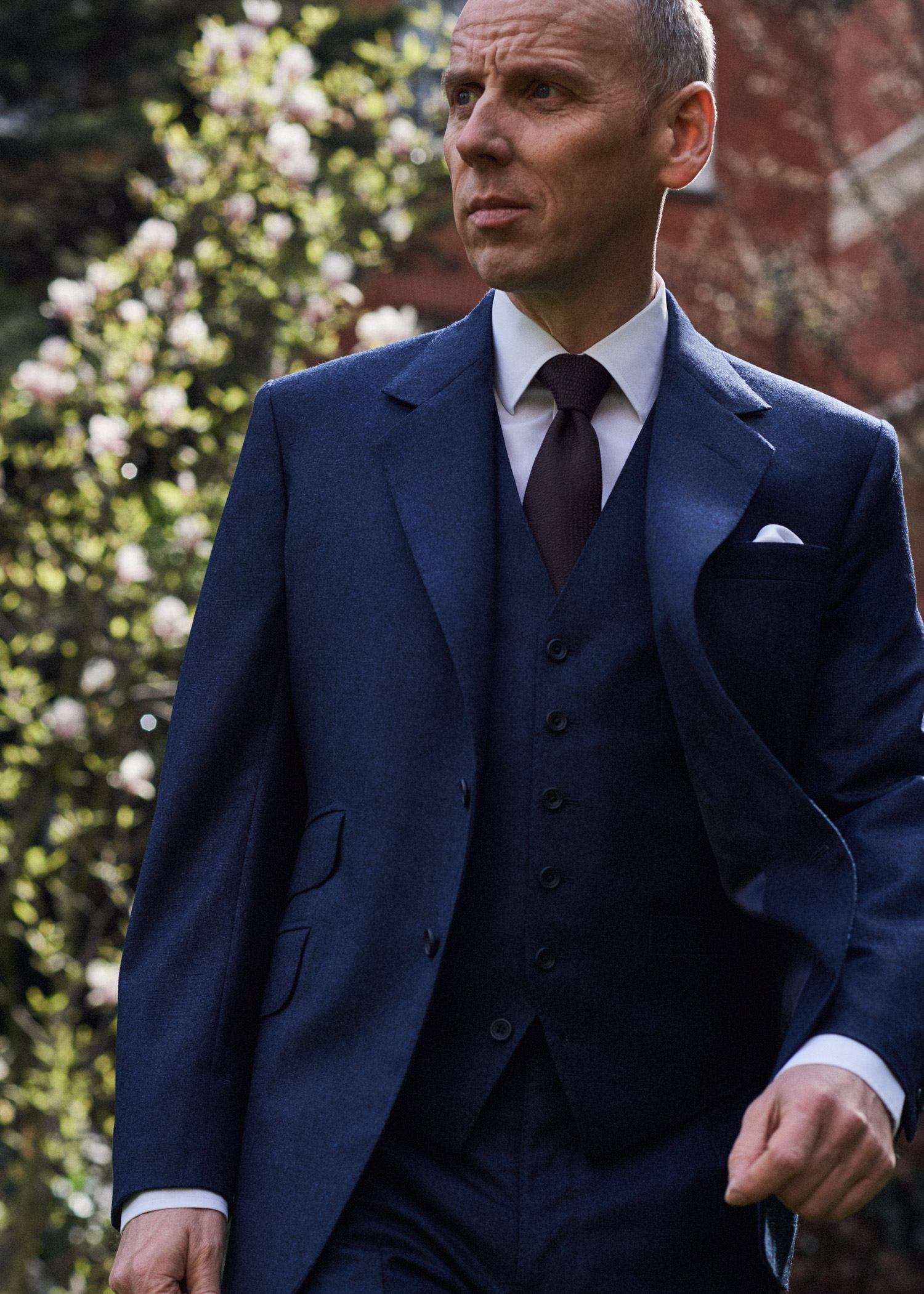
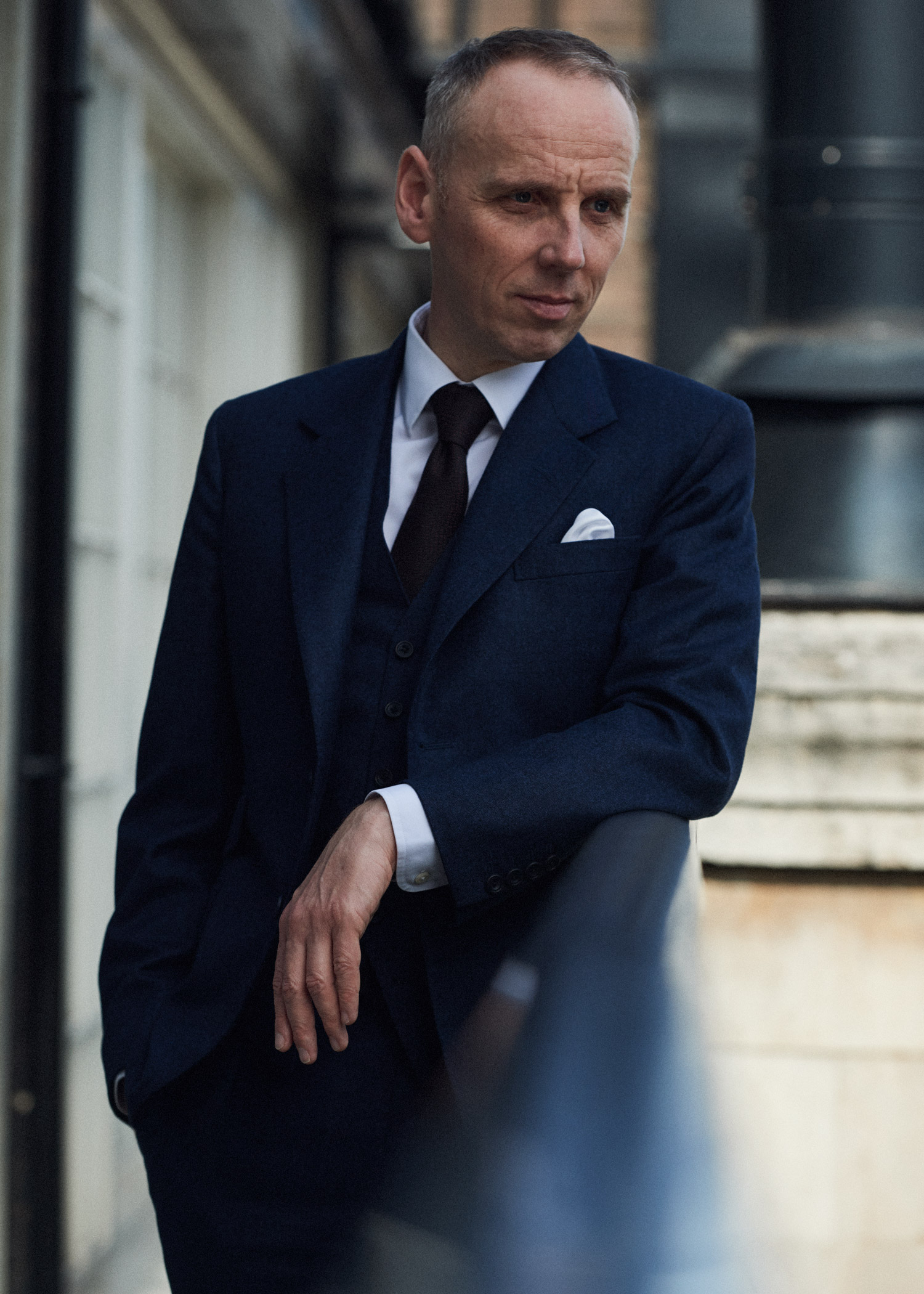
The clothes also suited the style of the film, which blended hyperreality and surreality to striking effect. “The first day of fitting, we tried on lots of stuff, but I was quite resistant,” says Bremner. “Then something clicked in me, and I started to see the potential of doing it this way. They were making something with theatrical expression, something more playful than a Mike Leigh who tries to capture reality sincerely, and that gives you something to play with. Spud could be probably more free-flowing than if he’d been more authentically dressed.” Indeed, the costumes turned them into what Bremner jokingly calls “superheroes” who populate the “Trainspotting universe”, like that of comic-book publishers-turned-film-makers Marvel and DC. The “designer junkies” were also trendsetters, as the fashion industry became hooked on heroin chic: “Rachael basically invented skinny jeans for men with that film. They didn’t exist before that time.”
“Rachael Fleming, the Trainspotting costume designer, basically invented skinny jeans for men with that film. They didn’t exist before that time”
Designer or not, films about junkies are unsurprisingly toxic at the box office, as cast and crew were acutely aware when making the first Trainspotting. And the resulting critical and commercial smash was a tremendously hard act to follow. “We certainly were nervous,” says Bremner. “In acting though, everything is a leap into the unknown. I don’t know how a scene is going to go, I don’t know how the line is going to come out of my mouth, I don’t know exactly what the response is going to be. If I’m not taking that leap, then I’m not giving my best work, because I’m holding something back. And if you don’t take that leap, nothing happens.” Even the insurance policy of the same cast and crew was no guarantee that the sequel wouldn’t fall short: “But if we’d gone in with a checklist to tick off, it would have been perfunctory and it wouldn’t be hitting people like a ton of bricks – like it is.”
Returning to the character of Spud after two decades was like putting on old clothes, says Bremner – metaphorically but also literally: “Some pieces from the original movie made it in – where we could still fit into them.” Including Spud’s trademark glasses, with lenses yellower than the room overlooking the Goring’s lawn. “Somehow I managed to hold on to them until we thought we might be making another film,” he continues. “We found a way to use them that was appropriate.” Given how much time had elapsed between the two films though, it was necessarily much more like pulling on new clothes.
“Rachael and her design partner, Steven Noble, really thought long and hard about how to update these guys but retain their individual qualities,” says Bremner. “But they knew the characters so well and they’ve got a radical eye. There’s a great designer based in Edinburgh called Kestin Hare, who also has a shop in London. He makes these super-cool clothes that are fairly modern but retro at the same time and really well-made. In the poster, I’m wearing this shorts suit with this floral pattern that Rachael found there: that was from their line last summer. I got quite a few things from there for the new film, but she would take them and dye them a terrible colour. She had some specialist down in the basement of the studio with goggles and vats, bubbling these potions, who’d bring them out reborn in completely unthought-of colour schemes.”
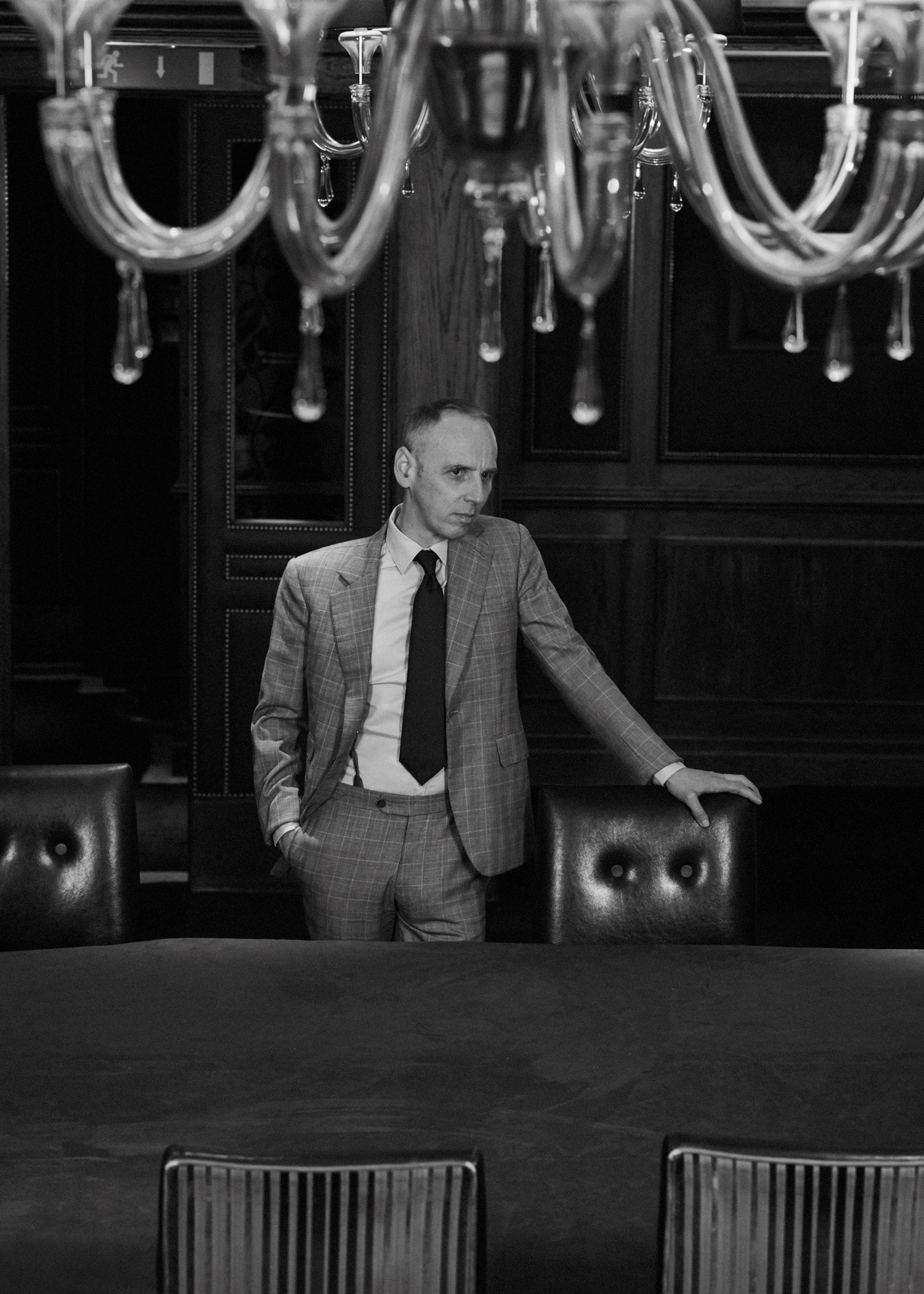
It wasn’t all an act; the cast and crew were of course themselves 20 years older. “It did make us reflect on the passage of time,” says Bremner. “I’ve done about five movies with Ewan, but a couple of those guys I hadn’t seen for 20 years. The first time round, we were all in our early to mid-twenties and we just took it for granted. This time around, it felt precious to be in each other’s company.”
Bremner has been acting since he was 14, having discovered his passion through youth theatres. “I liked being in that company,” he says. “Everybody was a few years older than me. Most of them were girls.” He got an agent so he could be seen for jobs, but didn’t view it seriously as a career until the success of Trainspotting. “I knew it was so precarious,” he says. “It’s so unpredictable whether you’re going to work or not this year. And that doesn’t mean you’re going to work the following year either. It’s not about being good or bad at it. You have to be mad enough to still put yourself out there.” Auditions can be as cringe-making as Spud’s speed-fuelled job interview, but thankfully they get easier with age: “If you’re not so lucky, the auditions aren’t coming in.”
Whatever the scale of the film, Bremner applies himself in the same way, “because it’s me that’s going to be up there on screen looking like an ass if I don’t know what I’m doing.” The main difference with the blockbusters is that they’re more cobbled together than the indies. “Because they’re such juggernauts, if they don’t go now, they’re not going to go at all, so they generally jump into production without a finished script,” he says. “It’s really normal on the big films to have a writer or two bringing new pages every morning. Whereas on a low-budget film, they don’t have that luxury, so they really sweat over the script before shooting. There’s so much money at stake that I thought it would be the other way around. Otherwise, why would you risk all those gazillions of dollars going down the toilet?” It would seem that some Hollywood producers’ bathrooms are even more lavish than those in the Goring’s royal suite.
Bremner is now a celestial body in the DC universe, albeit not an actual superhero, thanks to his role in Wonder Woman, out this June. As is standard with such top-secret projects, non-disclosure agreements dictate that he can’t reveal much, beyond the fact that he plays a shell-shocked sniper who returns to the battlefields of world war one to assist Princess Diana (not that one) in her mission. “With unexpected consequences,” he laughs.
And beyond that, Bremner is content to stride confidently into the unknown. “I’ve been really fortunate to have the opportunity to work with people who are really good at what they do,” he says. “My only wish is for that to continue. I’m open to the universe as to what form that will take – but I’m not going to be greedy and say I want to be the next James Bond, or Tom Cruise in Mission: Impossible. I’m going to let Tom carry on. He can relax. His job’s safe from me.”
